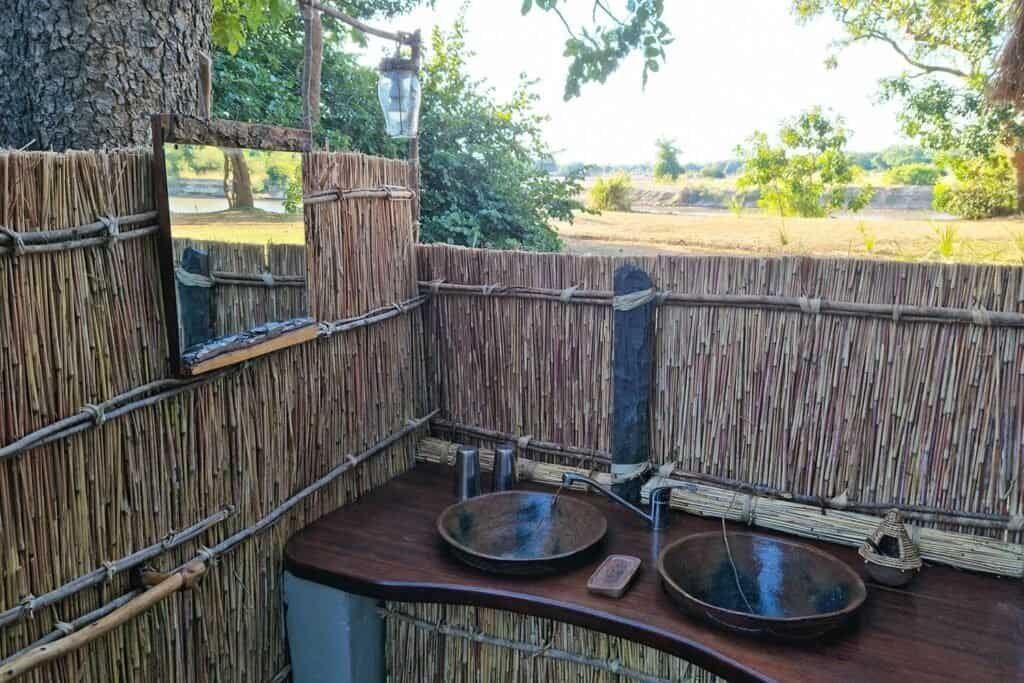Picture yourself immersed in the heart of the African wilderness, surrounded by pristine nature and exotic wildlife. As you return to your tented camp after an exhilarating day of safari adventures and a lovely sundowner – or two, nobody’s judging – it’s time to get cleaned up before dinner. In more remote camps, you will be using a bucket shower – a quintessential part of the authentic African safari experience.

Image (c) Kafunta Safaris
You might well be wondering, “What on earth is that?”
So in this article, I’m going to explore the wonderful world of bucket showers, their role in water conservation, and how they enhance the immersive, off-the-grid atmosphere of remote safari camps and lodges across Africa.
What is a Bucket Shower?
A bucket shower is a simple, yet effective, way to bathe in areas where running water is limited or unavailable, such as remote safari camps. The basic components include:
- Bucket or Container: A large bucket or waterproof canvas bag that holds the water.
- Shower Head or Tap: Attached to the bottom of the container to control water flow.
- Pulley System: To suspend the bucket overhead.
The typical capacity of a bucket shower ranges from 10 to 40 litres (2.5 to 10 gallons), providing enough water for a short but sufficient shower. To operate, camp staff fill the bucket with water heated by solar power, wood fires, or other means. Guests then use a simple tap or lever to control the flow of water from the bucket to the showerhead.
Bucket shower setups can vary from camp to camp. Most have private, enclosed bathrooms attached to permanent guest tents with flush toilets and sinks. Have a look at my video above of Kutali Camp in the Lower Zambezi in Zambia to see this kind of arrangement.
Others may be more rustic and the bucket may be hung from a tree over a simple outdoor enclosure with canvas “walls”. Regardless of the specific arrangement, bucket showers provide a hot shower experience while conserving water in areas with limited resources.
The Role of Bucket Showers on African Safaris
Bucket showers play a vital role in the African safari experience, particularly in remote camps and lodges where access to running water is limited. Many top safari destinations, such as the Maasai Mara in Kenya and mobile camps that follow wildlife migrations, rely on bucket showers due to their eco-friendly and water-saving benefits.
Water conservation is a critical concern in the African wilderness, where resources can be scarce. By using a limited amount of water per shower, typically 10-40 litres, bucket showers significantly reduce water consumption compared to traditional running showers. This not only helps preserve the precious resource but also minimizes the environmental impact of safari camps on the delicate ecosystems they inhabit.
Beyond their practical benefits, bucket showers contribute to the authentic, immersive atmosphere of an African safari. They harken back to the early days of safari travel and allow guests to disconnect from modern plumbing and embrace a simpler, more natural way of bathing. The rustic charm of a bucket shower adds to the sense of adventure and connection to the wilderness that draws travellers to Africa and nothing beats having a shower under the African skies.
While bucket showers are common in many safari camps, they are not the only option. Some lodges and camps offer running water, outdoor rain showers, or even luxurious bathtubs with a view.
And some make the most of the local building materials to create amazing bathrooms…

Image (c) Remote Africa Safaris
The choice between a bucket shower and other options ultimately depends on the camp’s location, environmental considerations, and guest preferences. However, for those seeking a true, off-the-grid safari experience, bucket showers remain an iconic and essential part of the journey.
How to Use a Bucket Shower
Using a bucket shower is a simple process, but it may take some getting used to for those accustomed to traditional running showers. Here’s a step-by-step guide:
- Before your shower, inform the camp staff, who will fill your bucket with hot water and hoist it above the shower area.
- Enter the shower enclosure and locate the tap or lever that controls the water flow from the bucket.
- Stand under the showerhead and turn the tap to start the flow of water. Adjust the flow as needed for your comfort.
- Wet your body, then turn off the tap to conserve water while you lather with soap or shampoo.
- Turn the water back on to rinse off, using short bursts to make the most of your limited water supply.
- When finished, turn off the tap completely and dry off with a towel.
To optimize your bucket shower experience and conserve water, try these tips:
- Wet your hair and body quickly, then turn off the water while shampooing and soaping up.
- Use biodegradable toiletries to minimize your impact on the environment.
- If the water pressure seems low, check if the bucket needs to be raised higher.
Almost all camps provide toiletries, towels and a flashlight to navigate when it’s dark. If not, I will of course let you know to bring your own.
Conclusion
Bucket showers are an integral part of the authentic African safari experience, offering a unique and eco-friendly way to bathe in the heart of the wilderness. By conserving water and minimizing the environmental impact of safari camps, bucket showers contribute to the sustainability of these precious natural areas.
While the idea of a bucket shower may seem rustic or unfamiliar at first, it quickly becomes a cherished part of the safari adventure. The simplicity and charm of this traditional bathing method allow travellers to disconnect from modern comforts and fully immerse themselves in the African bush.
As you plan your safari journey, embrace the opportunity to experience a bucket shower firsthand. Not only will you be participating in an iconic aspect of African wilderness travel, but you’ll also be playing a role in preserving the delicate ecosystems that make these adventures possible.
So, pack your sense of adventure, grab your biodegradable soap, and get ready to discover the simple but unforgettable pleasure of a bucket shower under the African sky.
